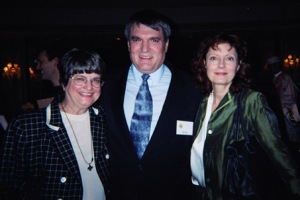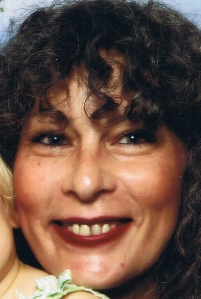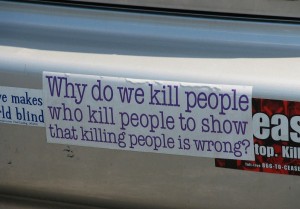The following is the text of a speech made by Peter Bellamy on the occasion of the protest against the death penalty outside the US Embassy, Grosvenor Square, London, on Friday 30th April 2010, organised by Voices for Death Row Inmates.
* * *
The date October 30th 2008 will forever live in my memory. It was the day my friend, Gregory Edward Wright, was wilfully and wrongfully executed by the State of Texas, USA. His final words to me were:
“I sure did not want to be writing a letter like this to you. If you are reading this, then you know the State of Texas has killed me. I am going to the other side of the door with my head held high. I know I am innocent, and the people killing me will suffer, when their time comes, for the crime against me. Thanks Peter for all of the help and the support. I hope I will be able to see you again.
With brotherly love, much respect, big hug, Greg.”
My correspondence and support of Greg lasted approximately three and a half years, from Spring 2005 to the day of his execution in October 2008. We exchanged hundreds of letters in that time, and I was able to speak with him on the telephone from Dallas, when he was having his DNA test and taking a polygraph; also, minutes before the execution. We became good friends and I came to understand the deficiencies of his trial and the broken system of US justice in respect of the death penalty. Gregory Edward Wright was innocent of murder.
In a polygraph volunteered by Greg, and paid for by his supporters, he protested his innocence. The conclusion of the polygraph expert was:
“After 3 test charts and a number of stimulus tests were administered, an analysis of the polygraph charts was made, and in my professional opinion Mr Wright is being truthful in all his answers to the relevant test questions.”
The story
Greg was accused of the murder of a woman in DeSoto, on the edge of Dallas. John Adams was separately tried and convicted of the same crime. Donna Vick, the victim, was in fact a friend, a good Samaritan, who offered Greg accommodation in exchange for help around the house and in the grounds outside. They became good friends in a very short time and Greg was able to get to grips with life again after time on the street following the temporary loss of his licence for a minor traffic offense. He was a long-distance truck-trailer driver. Donna and Greg identified a job opportunity for him nearby, but it required two people, and Greg remembered another homeless person, Adams, whom he thought would also be interested. Greg and Donna picked Adams up from Dallas with the idea that he would stay overnight with them in Donna’s home, and then set off early to try to get the jobs. During the evening, after a disagreement between Donna and Adams, the murder was committed while Greg was in the bathroom. He is deaf in one ear and thought the noise was coming from the TV. By the time he realized what was happening, it was too late to help Donna. It was at that point that Greg made his mistake – and it cost him his life in turn. Because Adams had pulled an assailant off him in a fight some weeks earlier, he thought he owed Adams a favour and didn’t report the murder. Over the next 24 hours, Adams decided he was likely to be identified as the killer from the evidence left in Donna’s stolen car. So he set Greg up to take the blame by planting the jeans and murder weapon in and close to the hut where Greg was sleeping out. In fact they had both shared the hut for a time. Adams made two 911 calls to the police, or rather the first was made by a businessman who reported Adams first confession. Then after wandering off, Adams made a second call himself. Greg’s defence attorneys were never told of that first 911 call until minutes before the start of the trial. And then they said the tapes could not be produced because they had been lost, in spite of the evidence that they had been delivered to the Prosecutor’s office. Because the tapes could not be produced, the evidence of Adams confession was deemed by the trial judge to be inadmissible in court. The jury never heard of it before making their judgment.
The trial
The indictment against Greg was as the sole killer. During the trial the prosecution tried to hedge their bets implying that even if the jury was unconvinced that the evidence proved he committed murder, they could convict on the law of parties. At that time the judge ruled they could not use that claim. However, the jury heard it, and was undoubtedly influenced by it. Also the 5th Circuit Federal Court of Criminal Appeals, in their final rejection of Greg’s appeals, used that same claim.
During the trial, the prosecution committed other inexcusable and illegal strategies to ensure Greg’s conviction. They hired an out-of-State ‘forensic expert’ to testify that he could identify a fingerprint taken at the scene as belonging to Greg. That, in spite of rebuttals of such possibility, both from State forensic officials and an independent forensic expert found by the prosecution, told the jury that he could not demonstrate by any means how he came to his conclusions of a match to Greg, but they would have to take his word for it. In other words, he was using ‘junk science’ to give the prosecution what they wanted. The defence attorneys failed to protect Greg’s constitutional rights in respect of this evidence, and it could therefore not be effectively challenged later by more competent appeal attorneys.
Prosecutorial games
Greg was denied DNA testing until the final months of his life, and then I and other supporters were obliged to pay for it. The prosecutors and trial judge then chose to interpret the inconclusive results against Greg, in spite of the fact that Adams DNA was found on the jeans, claimed by the prosecution to have been worn by the killer. Adams always denied having ever worn the jeans. Greg had admitted having tried them on once, as they had been included in a package sent to him by his family. But they were too small for Greg as was evidenced by physical measurements taken of his at the time of his arrest. In contrast, the jeans were the correct size to fit Adams. There was other evidence that Greg had been seen wearing jeans of a different colour and character, earlier on the day of the crime. In its final conclusions to the final appeal by Greg, the 5th Circuit Federal Court of Criminal Appeals, on the 29th October 2008, one day before Greg’s execution, said this:
“The recent [DNA] profile match clearly favours Wright to some degree, as it renders it more probable that Adams wore the jeans [used by the killer] at some point. However, even assuming that Adams wore the jeans at the time of the murder, there is still substantial evidence that Wright actively participated in the stabbings. In sum, the cumulative effect of the DNA testing and Adams’ letters cannot possibly amount to clear-and-convincing evidence that no reasonable jury could have convicted Wright of the murder. Wright has failed to make the threshold showing of innocence necessary to file a subsequent application pursuant to clause 2244 Accordingly, we need not consider the merits of Wright’s underlying claims for habeas relief.”
This verdict was described by his Defense Attorney as ‘legal fraud’ since Greg had never been on trial under the unique and much criticized Law of Parties, still employed in Texas. Also the ‘substantial evidence’ referred to by the court had already been shown by the defence to have no credibility of fact – including as it did the disputed fingerprint, unreliable evidence from a drug dealer suspected of having been given an undeclared deal of immunity, and evidence of other prosecutorial misconduct including the withholding of the 911 tapes and the confession made in them by Adams.
The confession
Finally, Adams himself had written letters of confession in the weeks just before Greg’s execution. Although later in court he had withdrawn his confession, which specifically absolved Greg of any complicity or function in the killing of Donna Vick, it is inconceivable that he would have made such multiple confessions, taking the risk that it would have been accepted as valid by the court. Especially since he had already gained a court order for the review of his own sentence. Had his confession been accepted as true then that sentence review would have almost certainly failed to alter his own sentence of death. Hi subsequent denial of the substance of his confession was then, motivated by the need to save his own life. As an addendum to the written confession, Adams specifically made this statement:
“My name is John Wade Adams. I want the record clear that Greg Wright is innocent of the crime he’s here on death row for. If you kill him you are killing an innocent man. Greg Wright was used as a scapegoat. I’m doing this because I’m tired of seeing innocent people being killed for murders they’ve not done. The statement I made is a lie, the one I made at the time of our arrest. Greg Wright is innocent! I was there and I know better. I set him up.”
He went on to say:
“If the District Attorney and Judge can’t accept [this confession] then his murder is on their hands. I set Maverick (Greg’s nickname in prison) up for the crime. Now here’s my fingerprint seven times. If they can’t get this right then they are dumb!”
Final words
Can I end by reading to you the statement Greg made from the gurney moments before the lethal drugs were pumped into his body?:
“There has been a lot of confusion on who done this. I know you all want closure. Donna had her Christianity intact when she died. She never went to a drug house. John Adams lied. He went to the police and told them a story. He made deals and sold stuff to keep him from going to prison. I left the house, and I left him there. My only act or involvement was not telling on him. John Adams is the one that killed Donna Vick. I took a polygraph and passed. John Adams never volunteered to take one. I have done everything in my power. Donna Vick helped me; she took me off the street. I was a truck driver; my Commercial Driver’s License was still active. Donna gave me everything I could ask for. I helped her around the yard. I helped her around the house. She asked if there was anyone else to help. I am a Christian myself, so I told her about John Adams. We picked him up at a dope house. I did not know he was a career criminal. When we got to the house he was jonesin’ for drugs. He has to go to Dallas. I was in the bathroom when he attacked. I am deaf in one ear and I thought the TV was up too loud. I ran into the bedroom. By the time I came in, when I tried to help her, with first aid, it was too late. The veins were cut on her throat. He stabbed her in the heart, and that’s what killed her. I told John Adams, ‘Turn yourself in or hit the high road.’ I owed him a favour because he pulled someone off my back. I was in a fight downtown. Two or three days later he turned on me. I have done everything to prove my innocence. Before you is an innocent man. I love my family. I’ll be waiting on y’all. I’m finished talking.”
An innocent life was taken that day. Greg rests in peace, but the United States should hang its head in shame. Please, abolish the death penalty.
Peter Bellamy












